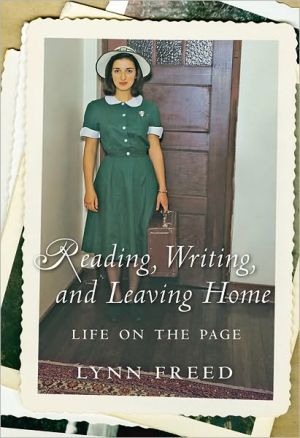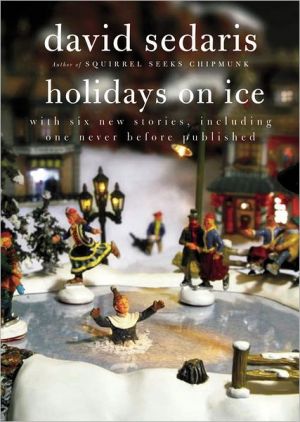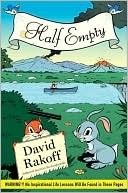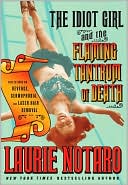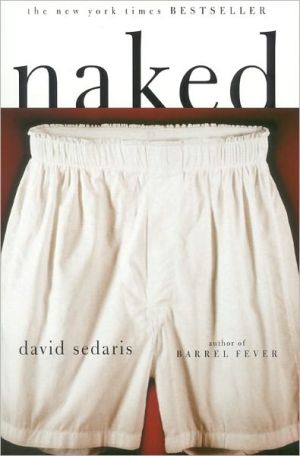Reading, Writing, and Leaving Home: Life on the Page
Equal parts revelation and inspiration, these eleven essays combine a memoir of an exotic life, reflections on the art and craft of writing, and a brilliant examination of the always complex relationship between fiction and life. An account of translating a difficult mother into fiction, "Taming the Gorgon," becomes a poignant and hilarious meditation on the intricate knot binding mothers and daughters. The story of a scandal created by publication, "Sex with the Servants," becomes an inquiry...
Search in google:
Equal parts revelation and inspiration, these eleven essays combine a memoir of an exotic life, reflections on the art and craft of writing, and a brilliant examination of the always complex relationship between fiction and life. An account of translating a difficult mother into fiction, "Taming the Gorgon," becomes a poignant and hilarious meditation on the intricate knot binding mothers and daughters. The story of a scandal created by publication, "Sex with the Servants," becomes an inquiry into the porous boundary between private truth and public betrayal. Whether examining the difference between a story told and a story written, or describing the trials and rigors of teaching writing to pay the rent, Freed surprises, instructs, and entertains. Learned, opinionated, and wickedly funny, Freed tears off all fictional disguises and exposes the human being behind the artist. For writers, readers, or anyone engaged in literature, this is essential reading.The New York Times Book Review - Holly BrubachReading books about writing is, in my experience, like reading books about sex: I'd rather be doing it. The telescoping of all life to a single activity, the ruminations on technique, the author's private epiphanies tend to make me restless. And often bored, since the caliber of most writing about writing is, oddly enough, rather low. Lynn Freed's Reading, Writing, and Leaving Home is the welcome exception—a wry, lively series of essays…on the parallel worlds of fiction and life, and the merciless task of shuttling between them. As in The Mirror, the finest of her novels, and The Curse of the Appropriate Man, a highly acclaimed recent story collection, this memoir of her formation as a writer is characterized by such virtuosity and rigor that the reader is tempted time and again to linger, admiring the view, retracing the shape of a sentence.
A Child's Reading\ ONLY LONG AFTER I WAS OLD ENOUGH to read for myself, did I really make the connection between literature and the printed word. My mother, whose first and abiding love was for the theatre, preferred to tell her own versions of the stories other parents read to their children from books. This way she could add characters at will, eliminate others, change the plot around, and thus string out the story into a series of episodic cliff-hangers that would last over a period of weeks or even months. The books themselves remained on our shelves, mouldy and full of bookworm in the hot, damp region of South Africa in which we lived.\ The first story I remember her delivering was Charles Kingsley's Water-Babies, one of those strange English tales for children, in which bad people with money and foul tempers bully small, poor, helpless, good people, often children. Good does triumph in the end, of course, but not before lessons have been learned and the wicked punished. In this particular story, Tom is a very young chimney sweep, who is employed by the evil Mr. Grimes. Tom runs away, falls into a river, and meets there the water-babies of the title, with whom he takes up residence.\ My mother, falling into an old literary trap, managed to make the evil characters, both above and below the water, far more appealing than Tom. As she came forth with yet another demon lying in wait for him, and he-too good to be true and a bit stupid-accomplished another narrow escape, I lay shivering with delight. When I finally came to read the book itself, with its angelic illustrations of the water-babies and even the rather predictably grumpy Mr. Grimes, I felt terribly let down. Not only was my mother's version better, but it seemed truer as well.\ What I did take on faith in this story, however-and in so many other stories fed to South African children when I was growing up-was that, contrary to what was true in my world, small white boys could be made to work for a living (girls, too-to wit the many tales of English waifs dressed in rags, who skivvied all day and were then consigned to freezing London attics to pray and shiver through the night). Also that snow fell at Christmastime, that there were fires rather than flower arrangements in fireplaces, and that hedgehogs, toads, foxes, and moles-not monkeys, snakes, and iguanas, the urban animals of my childhood-were the sorts of creatures which, in fiction, would stand up on their hind legs, don clothing, and sally forth into a story.\ More than this, I believed that these strange customs and creatures were more real than those of the world I lived in, and far more worthy of fiction. The real world of my childhood-a large subtropical port on the Indian Ocean, with beaches and bush and sugarcane and steaming heat, a strict Anglican girls' school, massive family gatherings on Friday nights and Jewish holidays, and then my parents' theatre world, the plays my mother directed, my father learning his lines every evening in the bath, both of them off to rehearsal night after night, leaving the next episode of her story for me to listen to on a huge reel-to-reel tape recorder-this world did not exist, not even peripherally, in the literature available to me. Nor did I think that it should.\ What I did encounter of indigenous South African literature came later, much later, at school. There, the odd poem or book (Roy Campbell, Laurens van der Post) would be included in an otherwise watertight English syllabus: Shakespeare, Jane Austen, Thackeray, Dickens, Hardy, and, of course, the King James Bible. There wasn't even any venturing into Bloomsbury or, across the Atlantic, to America, absolutely not. Our history teacher, who, like most of the teachers in the school was English, stopped short of teaching the First World War, which, said she in 1960, was still controversial.\ The Africa of popular imagination came to us via the radio. Until the midseventies, there was no television in South Africa, and so it was radio that offered programs like Tarzan of the Apes, to which I listened every evening in the kitchen with the servants. There we stood in rapt silence next to the fridge, on top of which the wireless sat in a place of honour.\ Meanwhile, the fact that I was learning to read did not bring my mother's nightly episodes to an end, far from it. She moved on to the Brothers Grimm, to Rudyard Kipling's Just So Stories (a world much more familiar to me than Tarzan's jungle), to The Wind in the Willows, which never engaged me, not even her version of it, and then to the plays of J. M. Barrie-Quality Street; Peter Pan; and my favourite, The Admirable Crichton. These she told from the point of view of whichever character she herself happened to have played on the stage.\ The books I was beginning to read for myself-by English children's author, Enid Blyton-were considered lower than comics by the local cognoscenti, chief among whom was one of my father's sisters, a psychologist. My mother, a natural foe to my father's family, to the whole idea of psychology, and, indeed, to censorship itself (except for Disney, which she would not countenance), lifted her ample nose in scorn. Blyton's books might trespass upon the rudimentary borders of correctitude being laid down, even then, by the likes of my aunt, but they had me reading for once, lying quietly on the verandah swing seat or down in the summerhouse, and then rushing back into the house to ask my mother to take a few more out of the library for me the next day.\ What Blyton understood very well, even in her Noddy books for the very young, was the universal desire of children to escape from the sovereignty of adults. And so, the fact that Noddy had his own car, which, like him, was an animated toy, and that he made off in it with Big Ears, his friend, or that later, in Blyton's pre-adolescent novels, Five Go Off in a Caravan, Hollow Tree House, The Naughtiest Girl in the School, there were rebels and runaways and naughty children finding adventure beyond the pale-this freedom was a wonderful thing for a girl living at the bottom of Africa and dreaming of leaving herself one day, somehow, for the real world.\ Unlike my mother, I was not a natural reader. I read slowly and quite haphazardly. As the youngest child in a large household of family and servants, I spent most of my time unsupervised, much of it outdoors. It was here that I was most alive to adventure and fantasy, creating grandiose scenarios from the top of the mango tree or taking off on my bicycle to explore. With books it was different. I read when it was dark, when it rained, when I was sick, or when I felt like company.\ Most of the books in the house were kept in my parents' study, a cosy room with leather chairs, teak bookshelves, leaded windows, and piles of scripts stacked around on the floor. It was there that my mother was to be found during the day, either timing scripts or drilling a new actor. And there that I was allowed to read whatever was available-mostly plays, but also opera libretti, the odd history, a few biographies, a selection of popular novels-as long as I didn't interrupt.\ One day I came upon a collection of books I'd never noticed-right in the back corner, behind the piles of scripts. They were books on the Holocaust. As soon as I discovered their existence, I returned to them obsessively, reading book after book and then rereading them, looking up words I did not understand, scrutinising the horrifying photographs so that, even to this day, they are burned into memory.\ In contrast to the comfortable remove at which I felt myself from the horrors of received children's fiction, nothing separated me from those of the Holocaust. They seemed quite able to reach off the shelf, out of a book, and swallow me. Other children I knew dreaded bogeymen under the bed, emblems, no doubt, of the revolution their parents expected to happen one day. My demons, however, were Nazis with guns and gas ovens. Having one's throat slit by the next-door neighbour's servant someday in the distant future seemed mild by comparison.\ AS I GREW older, my mother did not stop playing Mother Goose; she simply changed the old bedtime format. Driving along, she would tell me the story of a play she had just read, or a novel she was adapting for Lux Radio Theatre, or about an aunt, whose suitor had demanded a dowry that her mother had refused to pay and everyone had landed up marrying the wrong person and now look how unhappy they all were. I knew, of course, not to trust her version of things, but at the same time, over the years, I found myself reading a book or seeing a play or an opera in a kind of stereoscope: what was written, and then what could have happened, what should have happened.\ Even when my mother was too old, blind, and confused either to read or to be read to, still she managed to see goblins with pointed hats lurking on the verandah, men riding up the driveway on horseback, elegant ladies coming in for tea under the guise of her nurse. Together with so much else from her life-her husband, her home, and us, her audience-her text had vanished. And so she was doing the best she could with what was left to her-the imagination.\ Copyright © 2005 by Lynn Freed\ All rights reserved. No part of this publication may be reproduced or transmitted in any form or by any means, electronic or mechanical, including photocopy, recording, or any information storage and retrieval system, without permission in writing from the publisher.\ Requests for permission to make copies of any part of the work should be mailed to the following address: Permissions Department, Harcourt, Inc., 6277 Sea Harbor Drive, Orlando, Florida 32887-6777.
A Child's ReadingHonorary SonSex with the ServantsFalse Starts and Creative FailureEmbracing the AlienHome on the RangeThe Big SnoreDoing TimeTaming the GorgonMusgrave HouseNot Much of a Funeral
\ Holly BrubachReading books about writing is, in my experience, like reading books about sex: I'd rather be doing it. The telescoping of all life to a single activity, the ruminations on technique, the author's private epiphanies tend to make me restless. And often bored, since the caliber of most writing about writing is, oddly enough, rather low. Lynn Freed's Reading, Writing, and Leaving Home is the welcome exception—a wry, lively series of essays…on the parallel worlds of fiction and life, and the merciless task of shuttling between them. As in The Mirror, the finest of her novels, and The Curse of the Appropriate Man, a highly acclaimed recent story collection, this memoir of her formation as a writer is characterized by such virtuosity and rigor that the reader is tempted time and again to linger, admiring the view, retracing the shape of a sentence.\ —The New York Times Book Review\ \ \ \ \ Jonathan YardleyFor Freed, the most important experience has been leaving home, "the conundrum of alienation and belonging," "place and displacement." It is, obviously a subject of immense pertinence and interest in today's world, and in both fiction and nonfiction Freed has explored it with acuity and sensitivity. She also, it should be mentioned (and not merely in passing), writes with acuity and honesty about herself and her family; the recollections of her pleasingly eccentric mother and father are among the many attractions of this book. But mainly it is about writing, and it is one of the best books on that complex, elusive subject to come my way in a long time.\ — The Washington Post\ \ \ Publishers WeeklyFreed, author of five novels and, most recently, the story collection The Curse of the Appropriate Man, offers insights into her writing and her life in 11 clean, incisive essays that mix the personal with the instructional without going too deeply into either. How autobiography shapes fiction particularly interests her: in "Sex with the Servants," Freed describes how her novel Home Ground caused a scandal in her native South Africa (at the few book-related events that weren't cancelled, all anyone wanted to know was if she'd really touched her garden boy's penis). Her family, who also appeared in print, were not nearly as outraged, and for would-be writers, Freed offers several firm pronouncements ("Writers themselves are natural murderers"; "The real writer... is a moral reprobate"), which suggest that to worry about others' feelings cheapens one's art. This apologia for the way writers skewer those around them shares space with a careful consideration of her own work's themes-alienation, family, home, travel, performance-episodic but interesting glimpses into Freed's life (a larger-than-life mother, a wild family, a troubled marriage, a difficult gig teaching writing). Freed's honesty is always tempered by what feels like cool reserve, but this nevertheless is an instructive, enlightening book. 10 b&w photos. (Sept.) Copyright 2005 Reed Business Information.\ \ \ \ \ Library JournalLike a polished diamond, Freed's exploration of her writing life throws color in many directions. These 11 essays give the reader a look at her emotional calisthenics as she writes autobiographical fiction about the human condition, drawing on her family background and childhood in South Africa. It also examines the impact of autobiographical work on a writer's family and friends. The entire book is subtly infused with Freed's relationship with her father, who often jokes that she didn't give him much of a fictional funeral. The chapter "Sex with the Servants" explores the controversy behind Freed's novel, Home Ground (1986), which details an incident between a young white girl and a black garden boy. An essay on men and snoring illustrates the role of writers as storytellers, while other pieces emphasize the writing teacher as editor. Freed also quotes other authors explaining why they do or don't augment their writing with pinches of true experiences. Recommended for larger public and academic libraries.-Joyce Sparrow, Juvenile Welfare Board of Pinellas Cty., FL Copyright 2005 Reed Business Information.\ \ \ \ \ Kirkus ReviewsNostalgic, reflective essays on the writing life by the South African novelist Freed (House of Women, 2002, etc). Her favorite writers are V.S. Naipaul, Marguerite Duras, and Nancy Mitford, from whose work she quotes often in establishing the autobiographical cord to a novelist's craft. In 11 essays, Freed traces her trajectory from a 1960s childhood in Durban, South Africa, to her reinvention as a much-married expatriate novelist living in California. Freed begins with her reading lists as a child (Enid Blyton and the plays of J.M. Barrie) in an affluent household that until the mid-1970s, she notes, knew no television. The author dwells on the contrasting personalities of her parents, both actors. Freed's flamboyant, assertive Jewish mother was an especially strong presence; "the love affair she conducted with trouble" obsessed her daughter for 30 years. In the essay "Honorary Son," she explains that because her two older sisters were beautiful and being groomed for marriage, and her four "shadow" brothers had died in miscarriage, plain Freed was allowed to discover her true nature from her parents' beneficent neglect, and she gained confidence through defiance and self-assertion. "My sense of male entitlement has carried easily into every sphere of my life," she writes. She explores the autobiographical elements at length in her novels, especially the first, Home Ground, with its explosive opening paragraph detailing a white child's "pulling on the penis of the garden boy." (28) The book was subsequently banned in apartheid South Africa and beyond. Two essential elements in the development of the writer: years of practice and ruthlessness. Her own sense of ruthlessness took her awayfrom her homeland, as an exchange student in Far Rockaway, New York, and later as a teacher trying to impart to her writing students how to sustain a "focus" she took many years to find in her own life. Instructive, well-poised lessons from the trenches.\ \
